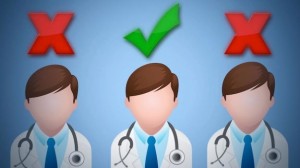March 18th, 2014 by Dr. Val Jones in Announcements, Health Tips
No Comments »
 I’m excited to announce that US News and World Report has invited me and some other social-media savvy physicians to participate in a live Twitter chat about how to find a good doctor. The chat will be held on Thursday, March 20th at 2pm EST. You can join the conversation by following the #DoctorFinder hashtag or take the pre-chat poll here.
I’m excited to announce that US News and World Report has invited me and some other social-media savvy physicians to participate in a live Twitter chat about how to find a good doctor. The chat will be held on Thursday, March 20th at 2pm EST. You can join the conversation by following the #DoctorFinder hashtag or take the pre-chat poll here.
Most people, including physicians, rely on personal references to find a good doctor. But what do you do when you’re far from home, or you don’t know anyone with firsthand knowledge of local doctors? My parents recently asked me to recommend a physician for them in a state where I knew none of my colleagues personally. This is the 10-step process that I used to help them navigate their way to an excellent specialist – I hope it helps others you find the right doctor as well!
1. Determine what kind of doctor you need. You’d be surprised how many different specialists treat the same symptom – depending on its underlying cause. Take “back pain” for example – should you see a primary care physician, an orthopedist, a neurosurgeon, an anesthesiologist, a rheumatologist, or a rehab specialist to evaluate your symptoms? That depends on the cause of the pain, which might not yet be evident to you. The first step to finding a good physician is to figure out which type is best suited to your potential diagnosis. Bouncing from specialist to specialist can be costly, so if you’re not sure which kind of physician specializes in treating your disease or condition (or if you haven’t been diagnosed yet), start with a primary care physician first.
If you’d like to ask an online physician about your symptoms (or find out which specialist would be the most appropriate for you or your loved one), eDocAmerica.com is my favorite online physician consultant service (note that I answer questions for them.)
2. Compile a list of all the doctors (of the specialty you need) in your area. This list can be generated by your insurance carrier or by an online search of doctor-finder databases such as Healthgrades.com, Vitals.com, or US News & World Report’s Doctor Finder directory.
3. Narrow online choices by your preferences (available via Healthgrades.com or Vitals.com databases.) Check out the doctors’:
Hospital affiliation(s)
Office location(s)
Educational background
Specialty interests
Languages spoken
Years in practice
Gender
Types of insurance accepted
Review CV if available (often on affiliated hospital website)
Check out patient reviews (take them with a grain of salt in case they are skewed by an unfairly disgruntled patient)
Make sure they’re accepting new patients
4. Do an online “background check” of your top choices.
5. Make an appointment – consider the following qualities in a good physician experience:
- The team: courteousness of scheduling staff, professionalism of nurses, PA’s, techs, etc.
- Facilities – cleanliness, comfort
- Medical records/communication – how will they provide you your data? EMR? Email?
- Timeliness/convenience
6. Come prepared
- Bring your list of medications
- Bring a list of your medical and surgical history/conditions
- Bring a list of your allergies
- Bring contact information for your other physicians/providers
- Bring your insurance information
7. Ask the right questions
- How many procedures (like the one I’ll need) have you performed previously?
- What are the risks/benefits of the procedure? Alternatives?
- What should I read to learn more about this?
- If unsure of diagnosis: What else could this be?
- Are there other medicines that are less expensive that we could substitute?
8. Go with your gut
- Did the doctor explain everything clearly?
- Did the doctor seem to care about you?
- Do you trust your doctor to be thorough with follow up?
- Do you like your doctor?
9. Get a second opinion
- If the doctor did not meet your expectations in any significant way, find another one
- If you want to be sure that you’re on the best path, get a second opinion from one of his/her peers or do it online: eDocAmerica (for generalist questions), Best Doctors (to be matched with top national specialists)
10. Reward good doctors with good online recommendations so others can benefit. Physician ratings are only as reliable as the reviewers. Help other patients locate good doctors by promoting those who deserve it.
December 16th, 2013 by Dr. Val Jones in Opinion
No Comments »
 I am consistently bemused by those who recommend more rigorous or more pervasive standardized testing as the primary means for insuring physician quality. The vast majority of physicians have already passed through a complex gauntlet of multiple choice exams, extended credentialing and certification processes, and lengthy tests of knowledge and skill. And yet, some physicians (to put it bluntly, sorry friends) are very bad at what they do.
I am consistently bemused by those who recommend more rigorous or more pervasive standardized testing as the primary means for insuring physician quality. The vast majority of physicians have already passed through a complex gauntlet of multiple choice exams, extended credentialing and certification processes, and lengthy tests of knowledge and skill. And yet, some physicians (to put it bluntly, sorry friends) are very bad at what they do.
Intellectual intelligence is necessary, but not sufficient, for doctoring. It is emotional intelligence (EI) that is sorely lacking – because it has neither been cultivated, nor selected for, by many training programs. Some educators openly acknowledge the problem, pointing to “extra-curricular activities” as their primary means of distinguishing equally qualified applicants. The disappointing reality is that non-academic performance may be a tie-breaker for students with similar standardized test scores, but raw scores almost always trump any other factor. In the end, we have a physician work force that is highly adept at assimilating and regurgitating facts, but is only accidentally good at human interactions.
Is there hope for change in this arena? I believe that the prognosis is guarded. As our culture becomes more and more digital data-driven, a tsunami of “meaningless use” threatens to drown us all in false quality measures, electronic medical record documentation “quality assurance” requirements, and analysis of trends without comprehension of context or influencing variables outside the scope of the measuring instruments. Lies, damn lies, and statistics. We can’t get enough! And guess who are the biggest proponents of these methods? Why, people who only excel at standardized testing – mostly because their true flaws also lie outside the measuring instruments. Bad doctors (sometimes turned-administrators) themselves are often fueling the onslaught of fruitless quality improvement initiatives.
Dr. Howard Luks, orthopedic surgeon and social media activist, wrote a provocative blog post on the subject of why physicians don’t engage more in social media. He suggests that many avoid it because they lack people-skills in the first place and don’t genuinely enjoy engaging with patients. If you’re a “jerk” in real life, he argues, then what advantage is there to making that more obvious on blogs, Facebook, Twitter, etc.? Better to stay socially quiet.
The interesting thing is that social media might be the most reliable way to discover whether or not your doctor is kind, thoughtful, observant, and detail-oriented. Reading a physician’s thoughts online can help you get to know their true personality and work ethic. In the future it would be nice if medical schools and residency training programs took the time to read applicants’ blogs (for example) instead of crunching their test scores for admission via the path of least resistance. An extra hour of reading up front could save our medical system from a new wave of low EI providers.
As Seth Godin put it, “Uncaring hands are worth avoiding.”
We all recognize the importance of this statement intuitively, but have a hard time quantifying “caring” with standardized tests. That’s why admissions officers and patients alike must use their judgment when selecting doctors. We pay verbal homage to the importance of “clinical judgment” in medicine but in reality are culturally afraid of straying from numbers to support our decision-making.
How will you know a good doctor? You’ll know him [or her obviously] when you see him. And sometimes you can see him best on social media platforms.
***
A few caveats of course:
1. Social Media is a sensitive but not specific test. Meaning, you can probably accurately identify caring doctors from their blogs, etc. but if they don’t have one, it doesn’t mean they aren’t good/caring.
2. It may not matter if you find a great doctor online if they’re not in your limited ACA network. 😕
3. Direct primary care is a potentially excellent way to get connected to exceptional doctors. I am a fan of this movement and have been actively involved in a practice in VA. The practices can reduce costs and enhance quality care, though recent caps on Health Savings Accounts (initiated by the Obama administration) have reduced consumer freedom to spend pre-tax income on direct primary care.
October 23rd, 2013 by Dr. Val Jones in Health Tips, Opinion
1 Comment »
 I realize that my blog has been littered with depressing musings on healthcare lately, and so I thought I’d offer up one very positive and “actionable” suggestion for all you patients out there. In the midst of a broken system where your doctor is being pressured to spend more time with a computer than listening and examining you, where health insurance rates and co-pays are sky-rocketing, and where 1 in 5 patients have the wrong diagnosis… There is one “magic” question that you should be asking your physician(s):
I realize that my blog has been littered with depressing musings on healthcare lately, and so I thought I’d offer up one very positive and “actionable” suggestion for all you patients out there. In the midst of a broken system where your doctor is being pressured to spend more time with a computer than listening and examining you, where health insurance rates and co-pays are sky-rocketing, and where 1 in 5 patients have the wrong diagnosis… There is one “magic” question that you should be asking your physician(s):
“What else could this be?”
This very simple question about your condition/complaint can be extremely enlightening. Physicians are trained to develop extensive “differential diagnoses” (a list of all possible explanations for a set of signs and symptoms) but rarely have time to think past possibilities 1 through 3. That’s one of the reasons why so many patients have the wrong diagnosis – which is both costly in terms of medical bills, time, and pain and suffering.
There is a risk in asking this question – you don’t want to be over-tested for conditions that you are unlikely to have, of course. But I maintain that the cost/risk of living with the wrong diagnosis far exceeds the risk of additional testing to confirm the correct diagnosis. So my advice to patients is to keep this very important question in mind when you see your doctor for a new concern.
In addition to asking this question of your doctor, you can also ask it during a second opinion meeting with another physician. The good news is that these days you don’t even need to get a second opinion in person. I myself have been working with an online second-opinion service called eDocAmerica for several years. Those who sign up for the service can pick the brains of board-certified U.S. physicians on any subject, 24-7 via email (and in some states via phone). The cost is extraordinarily reasonable when provided by employers, and winds up being about one or two dollars per member per month.
If you have a complicated disease or condition (such as cancer) where experts may not all agree on the best treatment plan, a company called Best Doctors offers detailed chart reviews and second opinions from top specialists at academic centers. Again, this service is quite affordable and reasonable if the cost is spread among a group. Employers are able to pay a small fee per employee per month to enroll the entire company in the service.
So why don’t all employers offer these benefits? I suspect that part of the reason is lack of awareness that second opinion services exist, and the other part is tepid demand on the part of employees. So if you’d like to make sure that you’re not one of the five people who have the wrong diagnosis, why not raise the question with your HR department? Enrolling as an individual is also an option, and still as inexpensive as about thirty dollars a month.
My bottom line: make sure you ask your doctor the magic question at least once for every new concern that you have. And if you’re too shy to do it, or your doctor’s answer seems too short, then get a second opinion online or in person.
This one little question could save your life.
September 1st, 2011 by EvanFalchukJD in Health Tips
No Comments »

Billionaire Teddy Forstmann has apparently been diagnosed with a serious form of brain cancer. There’s a tragic twist to the story: according to Fox Business News, Forstmann believes that for more than a year, he had been misdiagnosed with meningitis.
ABC News wonders:
How could such a misfortune befall a billionaire —- a man able to afford the best doctors, best technology and the most sophisticated diagnostic tests?
They’re missing the point. Misdiagnosis happens with shocking regularity – as much as Read more »
*This blog post was originally published at BestDoctors.com: See First Blog*
February 28th, 2011 by EvanFalchukJD in Health Policy, Opinion, True Stories
No Comments »

 Media reports on misdiagnosis continue to mount. A recent study on patients with Alzheimer’s found that half had been misdiagnosed. Half.
Media reports on misdiagnosis continue to mount. A recent study on patients with Alzheimer’s found that half had been misdiagnosed. Half.
Another headline blared “4 out of 10 patients being misdiagnosed.” The article encouraged patients to “see another doctor” if they are worried about their diagnosis.
You know what it makes me think about? Starbucks. Why? Because the way Starbucks revolutionized coffee drinking shows a way forward for healthcare.
Starbucks realized that since our lives focus on two places — home and work — most of us don’t have a “third place” to go. A place where we can be free of everyday distractions and take care of ourselves. Starbucks set out to create that “third place” by making its shops comfortable, inviting places. It works. “Third place” makes customers’ lives better — and Starbucks has almost 20,000 shops to prove it.
It’s time for a kind of “third place” in healthcare. Healthcare focuses on two places, too: The doctor’s office and the hospital. Both places are difficult for patients. Patients complain of not getting enough time from their overworked doctors, and studies of things that go wrong in hospitals are equally disturbing.
There really isn’t a “third place” to go to in healthcare. Somewhere that you can step outside of the difficult process of being sick. Somewhere you can get a quiet, clear perspective of what is going on.
Now, some people are lucky and can turn to relatives or friends who are doctors to provide some of that “third place” experience. But most people can’t. At Best Doctors, we’re creating the experience of a healthcare “third place.” We do it by taking the time to review each case, have doctors think about what’s happening, consult with experts, and share advice. Read more »
*This blog post was originally published at See First Blog*
 I’m excited to announce that US News and World Report has invited me and some other social-media savvy physicians to participate in a live Twitter chat about how to find a good doctor. The chat will be held on Thursday, March 20th at 2pm EST. You can join the conversation by following the #DoctorFinder hashtag or take the pre-chat poll here.
I’m excited to announce that US News and World Report has invited me and some other social-media savvy physicians to participate in a live Twitter chat about how to find a good doctor. The chat will be held on Thursday, March 20th at 2pm EST. You can join the conversation by following the #DoctorFinder hashtag or take the pre-chat poll here.


 I realize that my blog has been littered with
I realize that my blog has been littered with 








